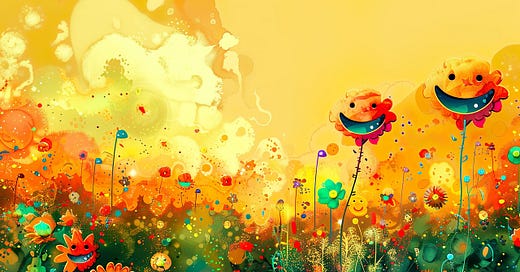The science of happiness
Did you know there’s a professor teaching happiness at Harvard Business School? I didn’t—until today. Turns out, Arthur C. Brooks, a behavioral scientist and professor at Harvard, has made it his mission to help people understand happiness. He even hosts a podcast called The Art of Happiness.
And it’s not just for stressed-out startup founders navigating burnout and loneliness. The science of happiness is useful for everyone. So, let’s break it down, simplify it, and give it a mild 10x Your Mind spin.
Happiness is not a feeling
You feel happiness, but happiness itself isn’t a feeling—it’s the result of certain actions, like how the smell of dinner means dinner is actually happening.
So, how do you cook up happiness?
Dr. Brooks says there are four key ingredients. But before we get to those, let’s talk about the role of genetics in happiness.
Your parents made you happy (or unhappy)
Yup, 50% of your natural happiness levels are genetic. Blame or thank your parents.
Another 25% is circumstantial—job promotions, money, unexpected windfalls make you happy. Losing a job or getting a bad performance review? Not so much. But….Circumstances don’t last.
That leaves the final and most crucial 25%: habits—things you can control to systematically increase happiness. If you get these right, they can override genetic tendencies and help you manage circumstances better.
Four ingredients of happiness are as follows:
1. Something to make you feel small
Sounds weird? Stay with me.
We spend so much time in our little world—my job, my family, my problems—that everything feels huge. A delayed flight? A traffic jam? The WiFi going out? The worst thing ever.
But when you zoom out—whether through faith, nature, philosophy, or simply looking at the night sky—you realize how small you actually are. And that’s a good thing. Because when you’re small, so are your problems.
2. Someone(s) to come home to…
Family matters.
And no, this isn’t about societal pressure to get married and have kids. It’s about connection. Studies show that people who share their lives with close family—whether that’s a spouse, kids, parents, or even a found family—are happier.
Countries like Japan and Italy are experiencing population declines because fewer people want kids. But beyond the big-picture implications, on an individual level, closeness with family boosts happiness.
You might argue over what to watch on Netflix or whose turn it is to do the dishes, but even those little annoyances beat eating dinner alone every night.
3. Someone to share your highs and lows with
Friendships—real ones. Not just social media connections.
Snapchat streaks don’t count. Watching someone’s Instagram stories daily doesn’t mean you know them. You know where they went last weekend, but do you know if they’re happy?
Friendship is about real connection—the kind where you can call someone in the middle of the night, and they’ll actually pick up.
A friend I hadn’t spoken to in five years called me recently. She was going through a tough time. My first thought? How can I comfort her? Not why didn’t she stay in touch all these years? Her call actually made my day, because it meant I was someone she trusted.
So here’s a challenge: Pick up your phone and reconnect with an old friend today.
4. Something to work toward—to be needed
Work gives life meaning.
Not the specific job you have, not even how much you earn, but the value you create. Whether you’re a teacher, a CEO, or a gardener, happiness comes from earning your success and serving others.
Humans have a deep need to be needed. When your work—whether professional or personal—adds value to others, it fuels joy. The Japanese call it Ikigai—the reason you wake up in the morning.
Happiness isn’t just something that happens to you. It’s something you create with the right priorities in your life.





